NUR226: Critical Appraisal of IV Medication Administration Report
VerifiedAdded on 2022/07/28
|5
|1865
|34
Report
AI Summary
This report critically appraises three case studies of IV medication administration, evaluating adherence to the Nursing and Midwifery Board of Australia (NMBA) standards of practice. The student identifies errors in procedure, including failures to obtain consent, verify medication labels, check for allergies, and reassess patients post-procedure. The analysis highlights breaches of standards related to safe practice, effective communication, and patient-centered care. The report reflects on the importance of each step in the medication process to ensure patient safety and quality of care. The student acknowledges a need to improve critical thinking, adhere to protocols, and enhance patient communication to minimize medication errors and improve overall care delivery. The report emphasizes the need for continuous learning and the importance of reassessment in nursing practice.
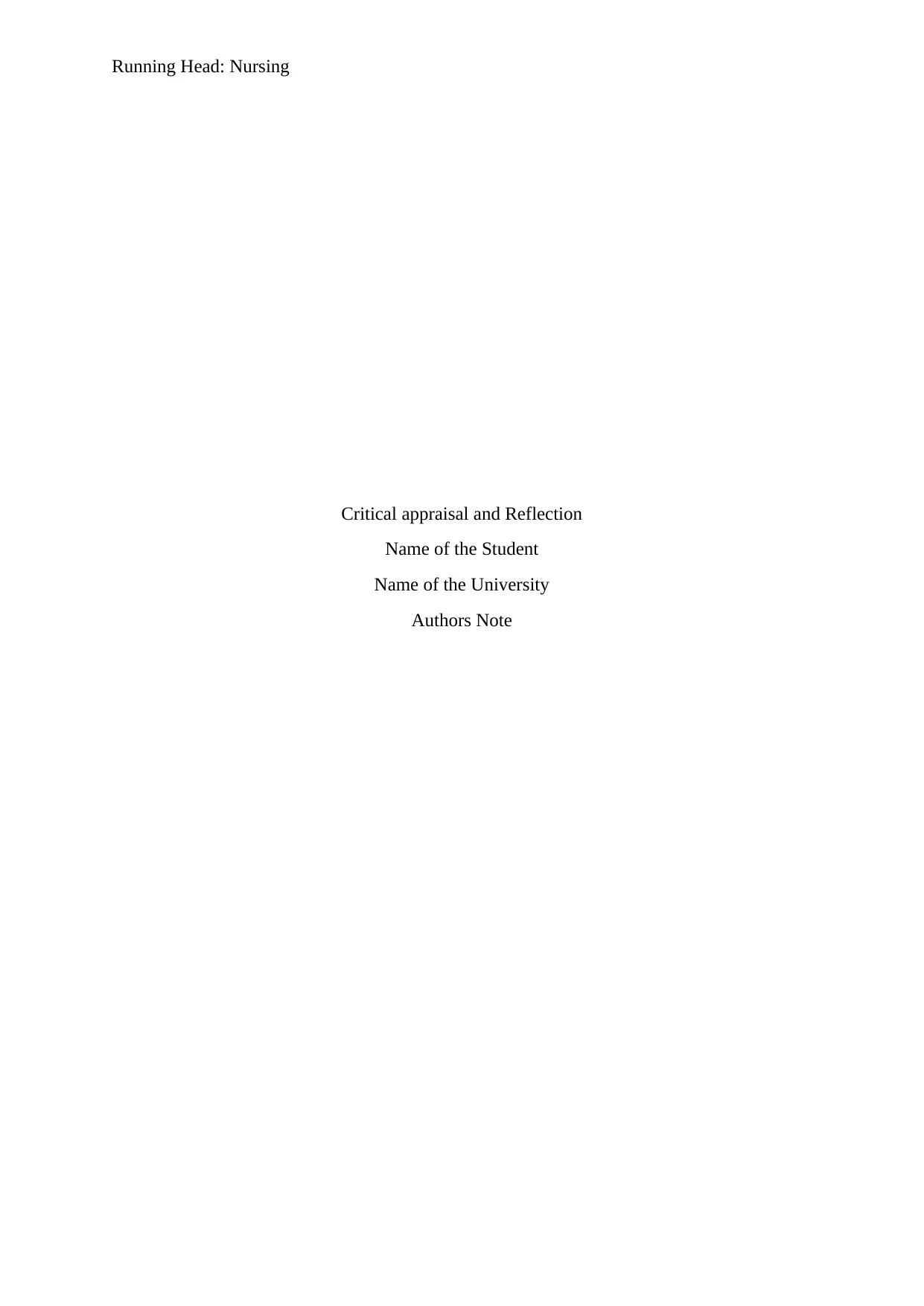
Running Head: Nursing
Critical appraisal and Reflection
Name of the Student
Name of the University
Authors Note
Critical appraisal and Reflection
Name of the Student
Name of the University
Authors Note
Paraphrase This Document
Need a fresh take? Get an instant paraphrase of this document with our AI Paraphraser
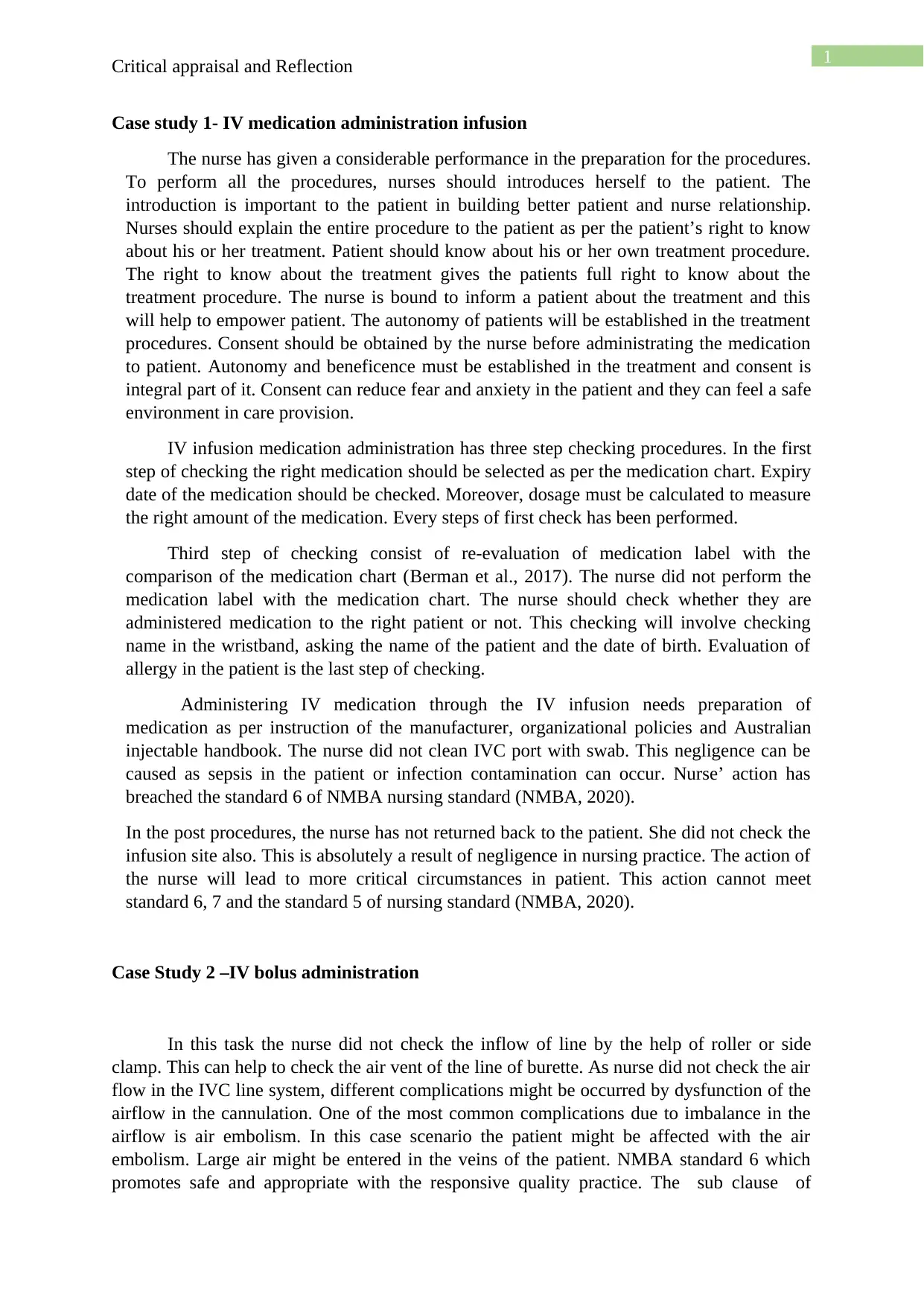
1
Critical appraisal and Reflection
Case study 1- IV medication administration infusion
The nurse has given a considerable performance in the preparation for the procedures.
To perform all the procedures, nurses should introduces herself to the patient. The
introduction is important to the patient in building better patient and nurse relationship.
Nurses should explain the entire procedure to the patient as per the patient’s right to know
about his or her treatment. Patient should know about his or her own treatment procedure.
The right to know about the treatment gives the patients full right to know about the
treatment procedure. The nurse is bound to inform a patient about the treatment and this
will help to empower patient. The autonomy of patients will be established in the treatment
procedures. Consent should be obtained by the nurse before administrating the medication
to patient. Autonomy and beneficence must be established in the treatment and consent is
integral part of it. Consent can reduce fear and anxiety in the patient and they can feel a safe
environment in care provision.
IV infusion medication administration has three step checking procedures. In the first
step of checking the right medication should be selected as per the medication chart. Expiry
date of the medication should be checked. Moreover, dosage must be calculated to measure
the right amount of the medication. Every steps of first check has been performed.
Third step of checking consist of re-evaluation of medication label with the
comparison of the medication chart (Berman et al., 2017). The nurse did not perform the
medication label with the medication chart. The nurse should check whether they are
administered medication to the right patient or not. This checking will involve checking
name in the wristband, asking the name of the patient and the date of birth. Evaluation of
allergy in the patient is the last step of checking.
Administering IV medication through the IV infusion needs preparation of
medication as per instruction of the manufacturer, organizational policies and Australian
injectable handbook. The nurse did not clean IVC port with swab. This negligence can be
caused as sepsis in the patient or infection contamination can occur. Nurse’ action has
breached the standard 6 of NMBA nursing standard (NMBA, 2020).
In the post procedures, the nurse has not returned back to the patient. She did not check the
infusion site also. This is absolutely a result of negligence in nursing practice. The action of
the nurse will lead to more critical circumstances in patient. This action cannot meet
standard 6, 7 and the standard 5 of nursing standard (NMBA, 2020).
Case Study 2 –IV bolus administration
In this task the nurse did not check the inflow of line by the help of roller or side
clamp. This can help to check the air vent of the line of burette. As nurse did not check the air
flow in the IVC line system, different complications might be occurred by dysfunction of the
airflow in the cannulation. One of the most common complications due to imbalance in the
airflow is air embolism. In this case scenario the patient might be affected with the air
embolism. Large air might be entered in the veins of the patient. NMBA standard 6 which
promotes safe and appropriate with the responsive quality practice. The sub clause of
Critical appraisal and Reflection
Case study 1- IV medication administration infusion
The nurse has given a considerable performance in the preparation for the procedures.
To perform all the procedures, nurses should introduces herself to the patient. The
introduction is important to the patient in building better patient and nurse relationship.
Nurses should explain the entire procedure to the patient as per the patient’s right to know
about his or her treatment. Patient should know about his or her own treatment procedure.
The right to know about the treatment gives the patients full right to know about the
treatment procedure. The nurse is bound to inform a patient about the treatment and this
will help to empower patient. The autonomy of patients will be established in the treatment
procedures. Consent should be obtained by the nurse before administrating the medication
to patient. Autonomy and beneficence must be established in the treatment and consent is
integral part of it. Consent can reduce fear and anxiety in the patient and they can feel a safe
environment in care provision.
IV infusion medication administration has three step checking procedures. In the first
step of checking the right medication should be selected as per the medication chart. Expiry
date of the medication should be checked. Moreover, dosage must be calculated to measure
the right amount of the medication. Every steps of first check has been performed.
Third step of checking consist of re-evaluation of medication label with the
comparison of the medication chart (Berman et al., 2017). The nurse did not perform the
medication label with the medication chart. The nurse should check whether they are
administered medication to the right patient or not. This checking will involve checking
name in the wristband, asking the name of the patient and the date of birth. Evaluation of
allergy in the patient is the last step of checking.
Administering IV medication through the IV infusion needs preparation of
medication as per instruction of the manufacturer, organizational policies and Australian
injectable handbook. The nurse did not clean IVC port with swab. This negligence can be
caused as sepsis in the patient or infection contamination can occur. Nurse’ action has
breached the standard 6 of NMBA nursing standard (NMBA, 2020).
In the post procedures, the nurse has not returned back to the patient. She did not check the
infusion site also. This is absolutely a result of negligence in nursing practice. The action of
the nurse will lead to more critical circumstances in patient. This action cannot meet
standard 6, 7 and the standard 5 of nursing standard (NMBA, 2020).
Case Study 2 –IV bolus administration
In this task the nurse did not check the inflow of line by the help of roller or side
clamp. This can help to check the air vent of the line of burette. As nurse did not check the air
flow in the IVC line system, different complications might be occurred by dysfunction of the
airflow in the cannulation. One of the most common complications due to imbalance in the
airflow is air embolism. In this case scenario the patient might be affected with the air
embolism. Large air might be entered in the veins of the patient. NMBA standard 6 which
promotes safe and appropriate with the responsive quality practice. The sub clause of
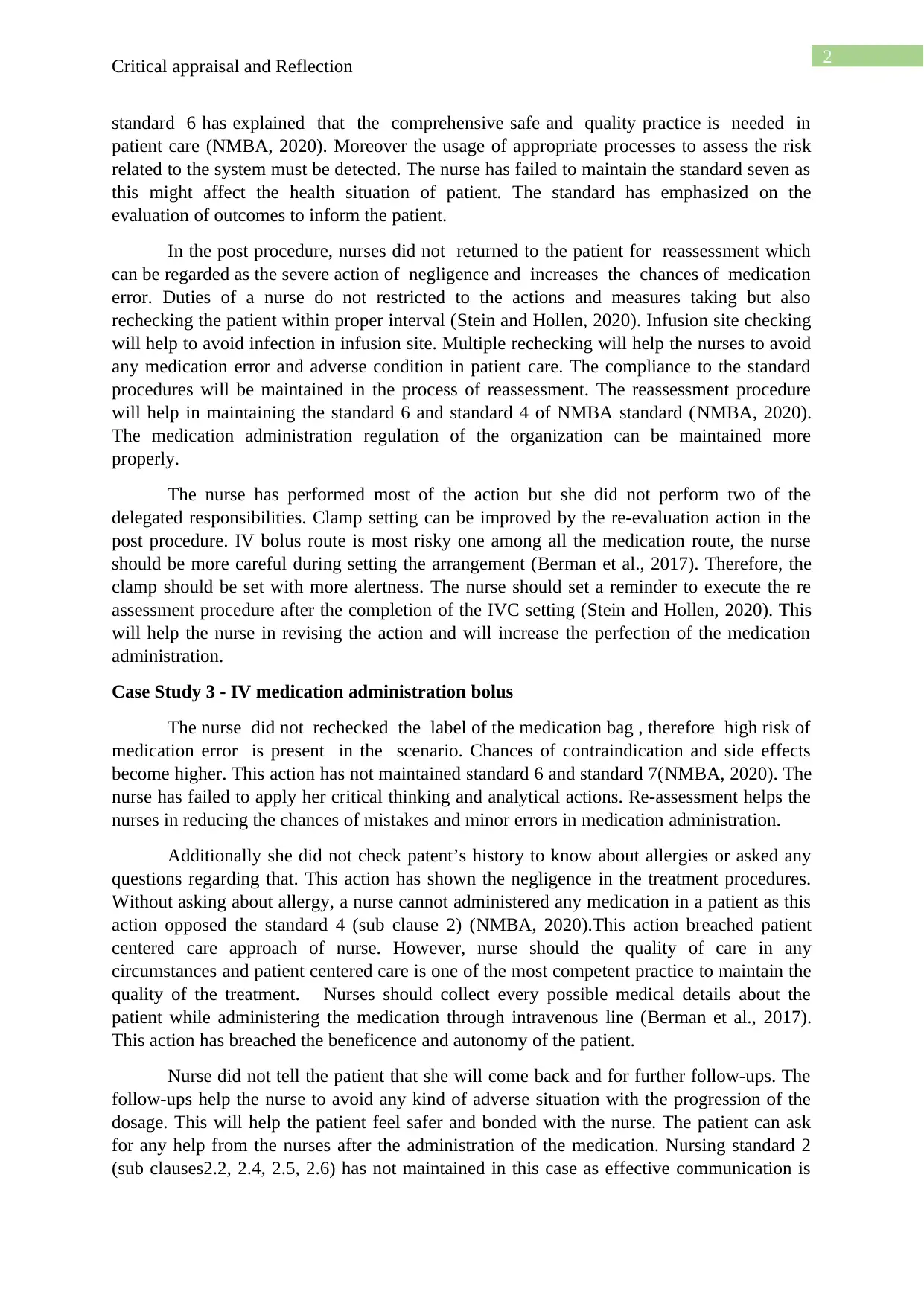
2
Critical appraisal and Reflection
standard 6 has explained that the comprehensive safe and quality practice is needed in
patient care (NMBA, 2020). Moreover the usage of appropriate processes to assess the risk
related to the system must be detected. The nurse has failed to maintain the standard seven as
this might affect the health situation of patient. The standard has emphasized on the
evaluation of outcomes to inform the patient.
In the post procedure, nurses did not returned to the patient for reassessment which
can be regarded as the severe action of negligence and increases the chances of medication
error. Duties of a nurse do not restricted to the actions and measures taking but also
rechecking the patient within proper interval (Stein and Hollen, 2020). Infusion site checking
will help to avoid infection in infusion site. Multiple rechecking will help the nurses to avoid
any medication error and adverse condition in patient care. The compliance to the standard
procedures will be maintained in the process of reassessment. The reassessment procedure
will help in maintaining the standard 6 and standard 4 of NMBA standard (NMBA, 2020).
The medication administration regulation of the organization can be maintained more
properly.
The nurse has performed most of the action but she did not perform two of the
delegated responsibilities. Clamp setting can be improved by the re-evaluation action in the
post procedure. IV bolus route is most risky one among all the medication route, the nurse
should be more careful during setting the arrangement (Berman et al., 2017). Therefore, the
clamp should be set with more alertness. The nurse should set a reminder to execute the re
assessment procedure after the completion of the IVC setting (Stein and Hollen, 2020). This
will help the nurse in revising the action and will increase the perfection of the medication
administration.
Case Study 3 - IV medication administration bolus
The nurse did not rechecked the label of the medication bag , therefore high risk of
medication error is present in the scenario. Chances of contraindication and side effects
become higher. This action has not maintained standard 6 and standard 7(NMBA, 2020). The
nurse has failed to apply her critical thinking and analytical actions. Re-assessment helps the
nurses in reducing the chances of mistakes and minor errors in medication administration.
Additionally she did not check patent’s history to know about allergies or asked any
questions regarding that. This action has shown the negligence in the treatment procedures.
Without asking about allergy, a nurse cannot administered any medication in a patient as this
action opposed the standard 4 (sub clause 2) (NMBA, 2020).This action breached patient
centered care approach of nurse. However, nurse should the quality of care in any
circumstances and patient centered care is one of the most competent practice to maintain the
quality of the treatment. Nurses should collect every possible medical details about the
patient while administering the medication through intravenous line (Berman et al., 2017).
This action has breached the beneficence and autonomy of the patient.
Nurse did not tell the patient that she will come back and for further follow-ups. The
follow-ups help the nurse to avoid any kind of adverse situation with the progression of the
dosage. This will help the patient feel safer and bonded with the nurse. The patient can ask
for any help from the nurses after the administration of the medication. Nursing standard 2
(sub clauses2.2, 2.4, 2.5, 2.6) has not maintained in this case as effective communication is
Critical appraisal and Reflection
standard 6 has explained that the comprehensive safe and quality practice is needed in
patient care (NMBA, 2020). Moreover the usage of appropriate processes to assess the risk
related to the system must be detected. The nurse has failed to maintain the standard seven as
this might affect the health situation of patient. The standard has emphasized on the
evaluation of outcomes to inform the patient.
In the post procedure, nurses did not returned to the patient for reassessment which
can be regarded as the severe action of negligence and increases the chances of medication
error. Duties of a nurse do not restricted to the actions and measures taking but also
rechecking the patient within proper interval (Stein and Hollen, 2020). Infusion site checking
will help to avoid infection in infusion site. Multiple rechecking will help the nurses to avoid
any medication error and adverse condition in patient care. The compliance to the standard
procedures will be maintained in the process of reassessment. The reassessment procedure
will help in maintaining the standard 6 and standard 4 of NMBA standard (NMBA, 2020).
The medication administration regulation of the organization can be maintained more
properly.
The nurse has performed most of the action but she did not perform two of the
delegated responsibilities. Clamp setting can be improved by the re-evaluation action in the
post procedure. IV bolus route is most risky one among all the medication route, the nurse
should be more careful during setting the arrangement (Berman et al., 2017). Therefore, the
clamp should be set with more alertness. The nurse should set a reminder to execute the re
assessment procedure after the completion of the IVC setting (Stein and Hollen, 2020). This
will help the nurse in revising the action and will increase the perfection of the medication
administration.
Case Study 3 - IV medication administration bolus
The nurse did not rechecked the label of the medication bag , therefore high risk of
medication error is present in the scenario. Chances of contraindication and side effects
become higher. This action has not maintained standard 6 and standard 7(NMBA, 2020). The
nurse has failed to apply her critical thinking and analytical actions. Re-assessment helps the
nurses in reducing the chances of mistakes and minor errors in medication administration.
Additionally she did not check patent’s history to know about allergies or asked any
questions regarding that. This action has shown the negligence in the treatment procedures.
Without asking about allergy, a nurse cannot administered any medication in a patient as this
action opposed the standard 4 (sub clause 2) (NMBA, 2020).This action breached patient
centered care approach of nurse. However, nurse should the quality of care in any
circumstances and patient centered care is one of the most competent practice to maintain the
quality of the treatment. Nurses should collect every possible medical details about the
patient while administering the medication through intravenous line (Berman et al., 2017).
This action has breached the beneficence and autonomy of the patient.
Nurse did not tell the patient that she will come back and for further follow-ups. The
follow-ups help the nurse to avoid any kind of adverse situation with the progression of the
dosage. This will help the patient feel safer and bonded with the nurse. The patient can ask
for any help from the nurses after the administration of the medication. Nursing standard 2
(sub clauses2.2, 2.4, 2.5, 2.6) has not maintained in this case as effective communication is
⊘ This is a preview!⊘
Do you want full access?
Subscribe today to unlock all pages.

Trusted by 1+ million students worldwide
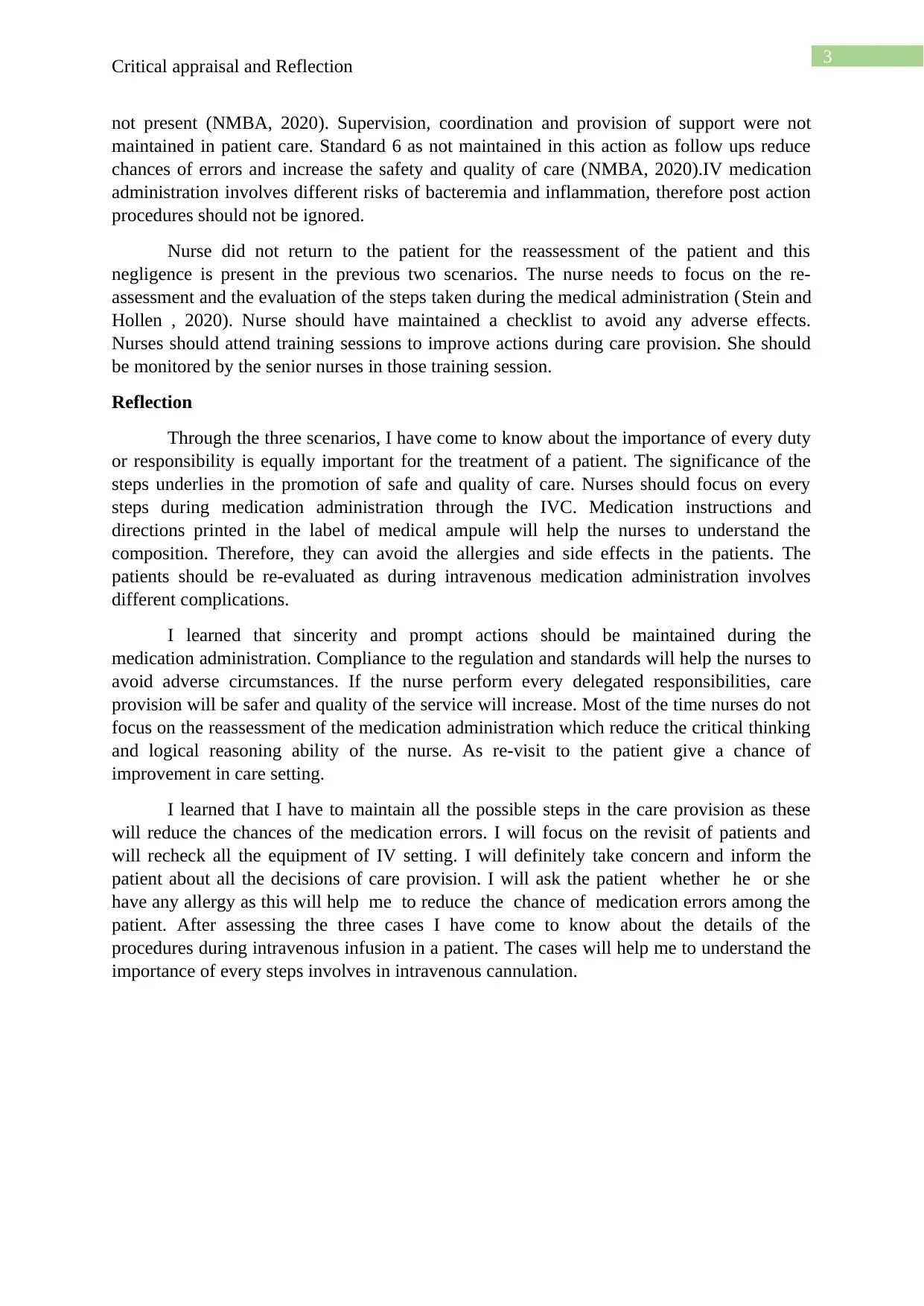
3
Critical appraisal and Reflection
not present (NMBA, 2020). Supervision, coordination and provision of support were not
maintained in patient care. Standard 6 as not maintained in this action as follow ups reduce
chances of errors and increase the safety and quality of care (NMBA, 2020).IV medication
administration involves different risks of bacteremia and inflammation, therefore post action
procedures should not be ignored.
Nurse did not return to the patient for the reassessment of the patient and this
negligence is present in the previous two scenarios. The nurse needs to focus on the re-
assessment and the evaluation of the steps taken during the medical administration (Stein and
Hollen , 2020). Nurse should have maintained a checklist to avoid any adverse effects.
Nurses should attend training sessions to improve actions during care provision. She should
be monitored by the senior nurses in those training session.
Reflection
Through the three scenarios, I have come to know about the importance of every duty
or responsibility is equally important for the treatment of a patient. The significance of the
steps underlies in the promotion of safe and quality of care. Nurses should focus on every
steps during medication administration through the IVC. Medication instructions and
directions printed in the label of medical ampule will help the nurses to understand the
composition. Therefore, they can avoid the allergies and side effects in the patients. The
patients should be re-evaluated as during intravenous medication administration involves
different complications.
I learned that sincerity and prompt actions should be maintained during the
medication administration. Compliance to the regulation and standards will help the nurses to
avoid adverse circumstances. If the nurse perform every delegated responsibilities, care
provision will be safer and quality of the service will increase. Most of the time nurses do not
focus on the reassessment of the medication administration which reduce the critical thinking
and logical reasoning ability of the nurse. As re-visit to the patient give a chance of
improvement in care setting.
I learned that I have to maintain all the possible steps in the care provision as these
will reduce the chances of the medication errors. I will focus on the revisit of patients and
will recheck all the equipment of IV setting. I will definitely take concern and inform the
patient about all the decisions of care provision. I will ask the patient whether he or she
have any allergy as this will help me to reduce the chance of medication errors among the
patient. After assessing the three cases I have come to know about the details of the
procedures during intravenous infusion in a patient. The cases will help me to understand the
importance of every steps involves in intravenous cannulation.
Critical appraisal and Reflection
not present (NMBA, 2020). Supervision, coordination and provision of support were not
maintained in patient care. Standard 6 as not maintained in this action as follow ups reduce
chances of errors and increase the safety and quality of care (NMBA, 2020).IV medication
administration involves different risks of bacteremia and inflammation, therefore post action
procedures should not be ignored.
Nurse did not return to the patient for the reassessment of the patient and this
negligence is present in the previous two scenarios. The nurse needs to focus on the re-
assessment and the evaluation of the steps taken during the medical administration (Stein and
Hollen , 2020). Nurse should have maintained a checklist to avoid any adverse effects.
Nurses should attend training sessions to improve actions during care provision. She should
be monitored by the senior nurses in those training session.
Reflection
Through the three scenarios, I have come to know about the importance of every duty
or responsibility is equally important for the treatment of a patient. The significance of the
steps underlies in the promotion of safe and quality of care. Nurses should focus on every
steps during medication administration through the IVC. Medication instructions and
directions printed in the label of medical ampule will help the nurses to understand the
composition. Therefore, they can avoid the allergies and side effects in the patients. The
patients should be re-evaluated as during intravenous medication administration involves
different complications.
I learned that sincerity and prompt actions should be maintained during the
medication administration. Compliance to the regulation and standards will help the nurses to
avoid adverse circumstances. If the nurse perform every delegated responsibilities, care
provision will be safer and quality of the service will increase. Most of the time nurses do not
focus on the reassessment of the medication administration which reduce the critical thinking
and logical reasoning ability of the nurse. As re-visit to the patient give a chance of
improvement in care setting.
I learned that I have to maintain all the possible steps in the care provision as these
will reduce the chances of the medication errors. I will focus on the revisit of patients and
will recheck all the equipment of IV setting. I will definitely take concern and inform the
patient about all the decisions of care provision. I will ask the patient whether he or she
have any allergy as this will help me to reduce the chance of medication errors among the
patient. After assessing the three cases I have come to know about the details of the
procedures during intravenous infusion in a patient. The cases will help me to understand the
importance of every steps involves in intravenous cannulation.
Paraphrase This Document
Need a fresh take? Get an instant paraphrase of this document with our AI Paraphraser
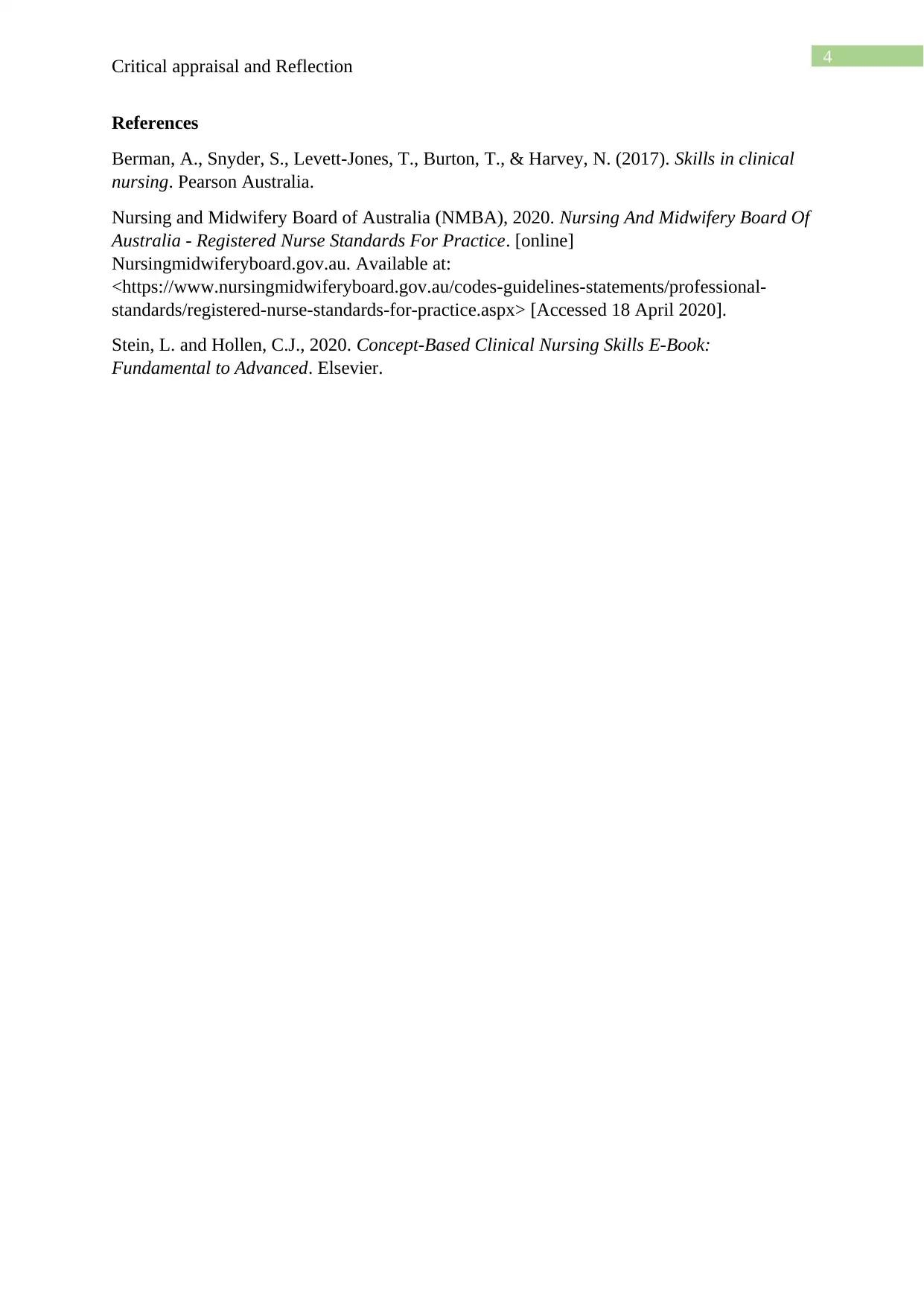
4
Critical appraisal and Reflection
References
Berman, A., Snyder, S., Levett-Jones, T., Burton, T., & Harvey, N. (2017). Skills in clinical
nursing. Pearson Australia.
Nursing and Midwifery Board of Australia (NMBA), 2020. Nursing And Midwifery Board Of
Australia - Registered Nurse Standards For Practice. [online]
Nursingmidwiferyboard.gov.au. Available at:
<https://www.nursingmidwiferyboard.gov.au/codes-guidelines-statements/professional-
standards/registered-nurse-standards-for-practice.aspx> [Accessed 18 April 2020].
Stein, L. and Hollen, C.J., 2020. Concept-Based Clinical Nursing Skills E-Book:
Fundamental to Advanced. Elsevier.
Critical appraisal and Reflection
References
Berman, A., Snyder, S., Levett-Jones, T., Burton, T., & Harvey, N. (2017). Skills in clinical
nursing. Pearson Australia.
Nursing and Midwifery Board of Australia (NMBA), 2020. Nursing And Midwifery Board Of
Australia - Registered Nurse Standards For Practice. [online]
Nursingmidwiferyboard.gov.au. Available at:
<https://www.nursingmidwiferyboard.gov.au/codes-guidelines-statements/professional-
standards/registered-nurse-standards-for-practice.aspx> [Accessed 18 April 2020].
Stein, L. and Hollen, C.J., 2020. Concept-Based Clinical Nursing Skills E-Book:
Fundamental to Advanced. Elsevier.
1 out of 5
Related Documents
Your All-in-One AI-Powered Toolkit for Academic Success.
+13062052269
info@desklib.com
Available 24*7 on WhatsApp / Email
![[object Object]](/_next/static/media/star-bottom.7253800d.svg)
Unlock your academic potential
Copyright © 2020–2025 A2Z Services. All Rights Reserved. Developed and managed by ZUCOL.





